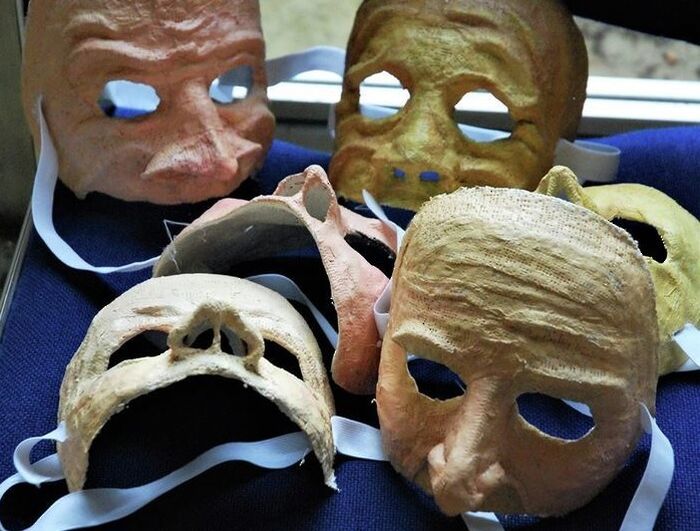Cicada 3301 review
This devised piece is ingenious and immediate, and delivered to perfection

Cicada 3301 is a brand new, quirky, devised piece from Cambridge University Fishbowl Theatre, bundling together a cast of lovable characters into a mysterious hour that combines ingenious physical theatre and simple yet slick technical design to explore the joys and pitfalls of living in the age of the world wide web. It’s like Indiana Jones for the internet generation; code-cracking digital daredevils journey across the globe from the basement room of a community church, roaming the now-ruined kingdoms of 4chan and scouring the secret corners of reddit for crucial clues. Most impressively of all, it has been devised in its entirety by its cast and creatives. And it’s some of the best student writing I have ever seen. Disclaimer: I know next to nothing about the internet, I don’t get memes, and I had never heard of the real-life Cicada 3301 mystery that the play is inspired by. Yet I found this show to be nothing short of a complete delight.
Cicada 3301 follows the story of Ash, Billy, Hannah and Olivia as they are unexpectedly drawn together over a shared pastime: trying to decode the bizarre internet riddles set for the world at large by the anonymous online organisation Cicada 3301. This phenomenon is the basis for the play’s story, and it’s actually real – Cicada 3301 is a modern mystery that hasn’t yet been solved, lending the show an exciting sense of immediacy. The actors are, from the offset, buzzing with as much excitement as their characters, and each of the cast of four turn in energetic, heartfelt and genuinely funny performances. Directors Issy Snape and Aaron Kilercioglu clearly have a sharp and intelligent eye for staging, and the show is structured to perfection. Particularly impressive are the dynamic movement sequences which are timed on the nose to great comedic effect, and the absolutely ingenious moment in which the auditorium goes dark and the characters, equipped with headlamps, venture into the dark web. To physicalise the internet space through theatre in this way is as smart and funny as it is fresh, and Snape and Kilercioglu’s control and creativity in pulling this off should be applauded.
"Not only are the cast believable as individuals, they also gel beautifully"
We are first introduced to Ash (Bilal Hasna), who we quickly learn is an endearingly earnest odd-ball with a fascination for the interconnectedness of trees and a love of puzzles. Hasna’s delivery is honest, intriguing and oftentimes very touching, and, holding the moral complexity of the piece on his shoulders, he is convincingly fervent in Ash’s commitment to solving the mystery at hand. Georgia Vyvyan, playing Olivia, often seems to be at the heart of the cast, uniting them around her confident performance just as Olivia unites the group with unwavering pragmatism and likeability. Beth Hindaugh and Milo Callaghan are both brilliantly adept in their roles as Hannah – the shy, awkward and very clever teenager of the group – and the cheekily sarcastic musician Billy. Not only are the cast believable as individuals, they also gel beautifully and spark off each other in a way that seems spontaneous, though can only come from the rapport and familiarity built in hours of shared work. The amount of effort that has been applied here is apparent; the ball of the audience’s attention isn’t dropped even for a second, and the ensemble performance is totally watertight both physically and vocally.
The show’s use of technology, not only in its concept but in its theatrecraft, must also be praised; Dmitry Bashtanov’s lighting design is both artistic and pin-point accurate, whilst Ruari Paterson-Achenbach delivers a soundscape that is charmingly witty (at one point, the use of Skype’s all-too-familiar sound effects draws a round of knowing laughs from the audience). Appropriately enough, Cicada 3301 is one of those shows in which the production’s performances and its tech are well and truly symbiotic, and it comes off like a dream.
Cicada 3301 naturally calls to mind the hugely popular Netflix anthology Black Mirror; it is a pleasingly dark, deeply morally challenging exposé of the wonders and dangers of technology, but it is elevated far beyond being a familiar cautionary tale by its playfully childlike innocence, infectious sense of adventure and sheer creativity.
What I found most surprising about this show was not only that it kept its grip on me from start to finish – a rare quality in student-written drama – but also that it sparked such a spectrum of feeling. The audience laughed out loud, zipped to the edge of our seats in fear, tutted in outrage, nudged each other perplexedly and even blinked away the odd tear. Really all there is left to say is this: if you are at the Fringe, go and see it before it’s gone. Oh, and if Cicada 3301 comes back to Cambridge for a home run at any point, I’ll be there trying to crack the code all over again.
 News / Caius mourns its tree-mendous loss23 December 2025
News / Caius mourns its tree-mendous loss23 December 2025 Comment / Yes, I’m brown – but I have more important things to say22 December 2025
Comment / Yes, I’m brown – but I have more important things to say22 December 2025 News / Clare Hall spent over £500k opposing busway 24 December 2025
News / Clare Hall spent over £500k opposing busway 24 December 2025 Interviews / Politics, your own way: Tilly Middlehurst on speaking out21 December 2025
Interviews / Politics, your own way: Tilly Middlehurst on speaking out21 December 2025 News / King appoints Peterhouse chaplain to Westminster Abbey22 December 2025
News / King appoints Peterhouse chaplain to Westminster Abbey22 December 2025









